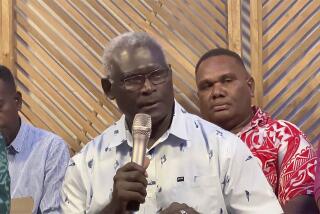Somalia’s prime minister quits amid feud with the president
- Share via
NAIROBI, KENYA — Somalia’s beleaguered prime minister, Ali Mohammed Gedi, resigned Monday after weeks of mounting tensions inside the Horn of Africa country’s transitional government and a power struggle with the president.
Gedi’s departure could open the door for a political breakthrough among Somalia’s warring clans, but some experts said it might also lead to an unraveling of the fragile U.N.-recognized government.
A somber Gedi announced his decision before a hastily convened session of parliament Monday in the city of Baidoa. During his three-year tenure, Gedi survived numerous assassination attempts and a no-confidence vote by parliament, where critics have vowed in recent weeks to unseat him.
“With respect to the situation the country is undergoing, the humanitarian catastrophe facing us and the long-standing deadlock among us, I welcome the resignation,” President Abdullahi Yusuf told lawmakers.
Yusuf, who has clashed repeatedly with Gedi, did not immediately name a replacement. Analysts say much of Somalia’s future is riding on his choice.
Given Somalia’s clan-divided politics, it is widely expected that Yusuf will name someone from Gedi’s Abgal clan. The large, influential clan has been one of the government’s most outspoken critics.
If Yusuf’s choice is unpopular, it might drive the clan into the arms of Mogadishu’s growing Islamic insurgency.
“This government has not been performing very well in a lot of areas and we hope breaking this stalemate will enable it to do better,” said one Western diplomat, who was not authorized to speak publicly and requested anonymity.
“We hope they use this opportunity to reach out to the clans and [opposition groups] and find a prime minister who will have a broader appeal and better reputation for building confidence.”
Among the candidates reportedly under consideration is Mogadishu Mayor Mohammed Dheere, whose harsh tactics in attempting to pacify the capital have come under fire.
Yusuf is also considering political outsiders who fled the nation’s violence and now live in the U.S. or Britain, according to some close to him.
Yusuf’s candidate also will probably need approval from Ethiopia, which exerts considerable influence on Somalia’s government and maintains an estimated 20,000 troops in the country. Gedi spent much of the last week in the Ethiopian capital, Addis Ababa, where Ethiopian officials attempted to mediate the dispute with Yusuf.
Somalia has been without a fully functioning government since the 1991 collapse of the Mohamed Siad Barre dictatorship. A transitional government, formed in 2004 in Nairobi, the Kenyan capital, seized control of Mogadishu last December with help from Ethiopian troops, ousting the Islamic Courts Union, an alliance of religious leaders.
Now Islamic fighters, some of whom the U.S. accuses of having links to terrorism, have shifted underground, attacking government and Ethiopian troops with roadside bombs, mortars and other guerrilla tactics.
The U.S. military assisted in ousting the Islamic courts, launching airstrikes against suspected terrorists and sharing intelligence with Ethiopian soldiers.
Somalia’s government is also facing a threat from a new group of Islamists, intellectuals and secular politicians, who joined forces last month after a conference in Eritrea, vowing to overthrow the government and push out Ethiopian troops.
The political turmoil comes after a weekend of deadly clashes in Mogadishu, reportedly led by a former Islamist security official who resurfaced recently there.
Witnesses said thousands of civilians had fled the city in the preceding three days, adding to an estimated 325,000 people who have been displaced by violence this year.
In some neighborhoods, protesters burned tires, blocked roads with logs and chanted anti-Ethiopian slogans, witnesses said.
Some lawmakers blame Gedi for failing to quell the violence and improve Somalia’s humanitarian crisis.
“Gedi failed to rehabilitate even a single elementary school or clinic around the country,” said Ibrahim Isak Yarow, a member of Somalia’s parliament.
Allegations of nepotism also dogged the former prime minister, a onetime veterinarian who was plucked from relative obscurity to become prime minister.
“He collected taxes from the airport and the seaport and put the money in his pocket and his family’s mouth,” said Abdullahi Tooxow, a Mogadishu student. “But at the same time, government police were not paid their salaries in six months.”
Gedi’s position grew increasingly precarious in recent months after he clashed directly with the president over a variety of issues, including the awarding of oil-exploration deals and a corruption investigation.
--
Special correspondent Mohammed Bile in Mogadishu contributed to this report.
More to Read
Sign up for Essential California
The most important California stories and recommendations in your inbox every morning.
You may occasionally receive promotional content from the Los Angeles Times.












